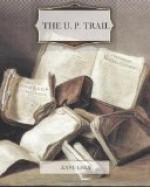“Mother!” gasped Allie, “is that what he meant?”
“Forget him, child. And forget your mother’s guilt! ... I’ve suffered. I’ve repented.... All I ask of God is to take you safely home to Allison Lee—the father whom you have never known.”
The night hour before dawn grew colder and blacker. A great silence seemed wedged down between the ebony hills. The stars were wan. No cry of wolf or moan of wind disturbed the stillness. And the stars grew warmer. The black east changed and paled. Dawn was at hand. An opaque and obscure grayness filled the world; all had changed, except that strange, oppressive, and vast silence of the wild.
That silence was broken by the screeching, blood-curdling yell of the Sioux.
At times these bloody savages attacked without warning and in the silence of the grave; again they sent out their war-cries, chilling the hearts of the bravest. Perhaps that warning yell was given only when doom was certain.
Horn realized the dread omen and accepted it. He called the fugitives to him and, choosing the best-protected spot among the rocks and wagons, put the women in the center.
“Now, men—if it’s the last for us—let it be fight! Mebbe we can hold out till the troops come.”
Then in the gray gloom of dawn he took a shovel; prying up a piece of sod, he laid it aside and began to dig. And while he dug he listened for another war-screech and gazed often and intently into the gloom. But there was no sound and nothing to see. When he had dug a hole several feet deep he carried an armful of heavy leather bags and deposited them in it. Then he went back to the wagon for another armful. The men, gray-faced as the gloom, watched him fill up the hole, carefully replace the sod, and stamp it down.
He stood for an instant gazing down, as if he had buried the best of his life. Then he laughed grim and hard.
“There’s my gold! If any man wins through this he can have it!”
Bill Horn divined that he would never live to touch his treasure again. He who had slaved for gold and had risked all for it cared no more what might become of it. Gripping his rifle, he turned to await the inevitable.
Moments of awful suspense passed. Nothing but the fitful beating of hearts came to the ears of the fugitives—ears that strained to the stealthy approach of the red foe—ears that throbbed prayerfully for the tramp of the troopers’ horses. But only silence ensued, a horrible silence, more nerve-racking than the clash of swift, sure death.
Then out of the gray gloom burst jets of red flame; rifles cracked, and the air suddenly filled with hideous clamor. The men began to shoot at gliding shadows, grayer than the gloom. And every shot brought a volley in return. Smoke mingled with the gloom. In the slight intervals between rifleshots there were swift, rustling sounds and sharp thuds from arrows. Then the shrill strife of sound became continuous; it came from all around and closed in upon the doomed caravan. It swelled and rolled away and again there was silence.




